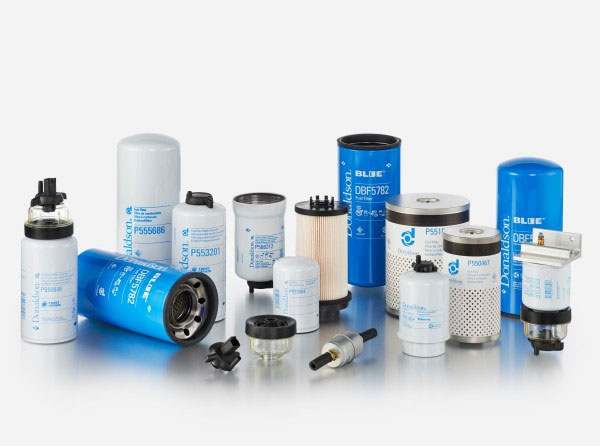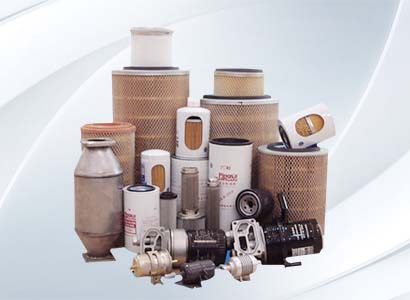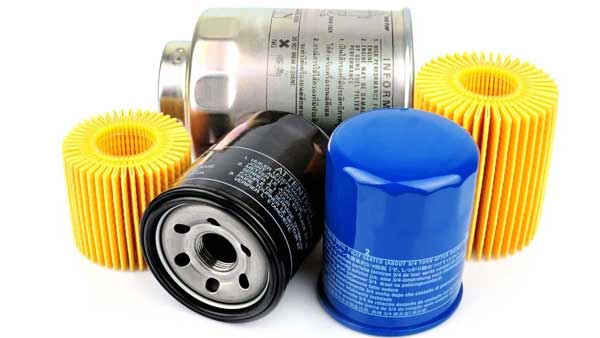The fuel filter plays a very critical role in the automobile engine, which is mainly reflected in the following aspects:
1. Guarantee engine performance: Only original gasoline filters that match or exceed matching quality can provide the clean fuel required by the electronic injection system, thereby optimizing engine performance and providing the best protection for the engine. The fuel filter cleans the fuel and keeps out impurities that may cause clogging and wear of the nozzles or fuel pump.
2. Protect key components of the engine: The role of the fuel filter is not only to protect key components of the engine, but also to improve fuel combustion efficiency, reduce emissions, and reduce pollutant emissions. Filtering out harmful particles and water in the engine fuel system can protect key components such as oil pumps, oil nozzles, cylinder liners, and piston rings and reduce their wear.
3. Improve the reliability of the car: filtering out impurities in the fuel through the filter element can ensure the cleanliness of the fuel. This will help reduce mechanical wear, ensure stable engine operation, and improve vehicle reliability.
The fuel filter mainly consists of a filter can and a filter element. The filter tank is generally made of aluminum alloy or plastic; the filter element is made of high-strength, corrosion-resistant special paper, non-woven fabric or fine mesh alloy. When fuel passes through the filter element, the micropores of the filter element can intercept and absorb impurities such as tiny fibers, particles, and sediments, thereby ensuring that only pure gasoline is supplied to the engine.
The specified replacement period of the fuel filter is generally 15,000-20,000 kilometers, or half a year to one year. Please refer to the vehicle owner's manual for details. The fuel filter is a consumable item. Over time, it will absorb more impurities, which will greatly reduce the speed of gasoline flowing to the engine, affect the normal operation of the engine, and may even damage the engine, so it is very important to replace it regularly.
In general, the fuel filter plays the role of cleaning fuel, ensuring the normal operation of the engine and improving the reliability of the car. It is an indispensable part of the normal operation of the engine. If there is a problem with the fuel filter, or if it is used for too long, it may cause a decrease in engine performance or even damage the engine. Therefore, it is very necessary to replace the fuel filter regularly and choose products with excellent quality and performance.

The working principle of the engine fuel filter is actually quite simple, but it is very important. Next, we describe how it works in detail.
The main structure of the fuel filter is a sealed container filled with porous filter elements. When gasoline flows from the inlet into the filter, it begins to contact these screens.
The fuel filter mainly uses this filter element to filter gasoline. The material of the filter element is composed of multiple layers of special materials such as fiber, metal mesh or synthetic materials. These materials have many tiny, densely packed holes, called pores.
When gasoline passes through the filter element, the micropores of the filter element begin to work. Impurities such as particles, dust, and moisture in gasoline cannot pass through the filter element because they are larger than the micropores of the filter element, and are left on the outside of the filter element. Pure gasoline can flow through the micropores of the filter element and flow into the car engine from the outlet.
In this way, even if there are many small impurities in the gasoline that may damage the engine, they can be filtered out through the fuel filter, so that the gasoline that eventually flows into the engine combustion chamber remains clean, reducing wear on the internal parts of the engine, improving the engine's working efficiency and improving the efficiency of the engine. Extended service life.
However, as the filter element filters gasoline for a longer time, there will be more and more impurities on the surface of the filter element, which will reduce the working efficiency of the fuel filter and may even affect the flow of gasoline. Therefore, the fuel filter is a consumable item in the car and needs to be replaced regularly to ensure its working efficiency and protect the function of the car engine.
In general, the working principle of the fuel filter is to use the micropores of the filter element to physically intercept and adsorb impurities in the gasoline through the filter screen, thereby achieving the purpose of cleaning the gasoline and protecting the engine.
The engine fuel filter plays a vital role in the operation of the car. Its main advantages and advantages are as follows:
1. Protect the healthy operation of the engine
The primary function of the fuel filter is to filter impurities in the fuel, even tiny particles, such as dust, metal particles, etc. If these impurities enter the engine, they will cause a certain degree of wear and tear on its interior. When the fuel filter is running well, it can prevent these small debris from entering the engine as much as possible, thereby reducing wear and tear on engine parts and extending the service life of the engine. Although this protection is "silent", it is vital to healthy engine operation.
2. Improve engine efficiency
When the fuel filter removes impurities from the fuel, it can provide purer fuel to the engine. This helps the engine work more efficiently because impurity-free fuel can mix with air more efficiently and burn completely, generating more power. In this way, the engine will perform better and run more stably, which is often reflected in increased acceleration, horsepower and torque. This means that the driving performance of the vehicle is improved.
3. Increase fuel economy benefits
Clean fuel allows the engine to work at its best, thereby improving fuel economy. This advantage may not be obvious every time you refuel, but over the long term, you can find the contribution of the fuel filter to saving fuel expenses. When the fuel passes through the filter, the impurities in it are filtered out, which allows the fuel to burn better, avoids waste of fuel, and improves fuel economy.
4. Easy to replace and low maintenance cost
Most fuel filters are well designed and can be quickly and easily replaced. This avoids spending too much effort and money on replacing the fuel filter. Every car owner can perform regular self-inspections and replacements to ensure the normal operation of the engine without frequent trips to the car repair shop. For experienced car owners, self-replacing fuel filters allows for more personalized choices, and you can choose a more suitable fuel filter according to your own needs.
5. Various types, which can adapt to the needs of different vehicles
Whether it's an older model or the newest car, you can find the most suitable one from a wide range of fuel filters. This is not only reflected in the type of filter element, but also includes the configuration of the fuel filter, the air flow rate, and the filtration efficiency of the filter element. In general, no matter which car you own, you can find a product that suits your needs in fuel filters.
To sum up, the fuel filter has the advantages of protecting the engine, improving performance, improving fuel economy, being easy to replace, and being rich in types. It is not only an important component to protect the car, but also an important tool to improve the performance of the car.

Fuel filters can increase fuel economy, mainly in the following directions:
1. Improve combustion efficiency The fuel filter is responsible for removing impurities and metal particles in the fuel, which ensures the purity of the fuel so that the fuel can be fully mixed with air and burned. Since there are no impurities, the fuel burns more fully and thoroughly, thereby improving combustion efficiency. In this process, the combustion energy of the fuel is better utilized, which means that every drop of fuel can play its maximum role, which improves fuel economy.
2. Reduce maintenance costs For a fuel filter, the cost is far lower than the cost of engine maintenance. The fuel filter can effectively prevent various impurities from entering the engine and reduce wear and tear on the engine. If there is no fuel filter to filter the fuel, impurities in the fuel will cause damage to the engine, necessitating the need to repair or replace certain parts. Such expenses may not be obvious in the short term, but over the long term, the role of the fuel filter in reducing maintenance costs will become obvious, thereby improving fuel economy.
3. Extend the life of the engine. The function of the fuel filter can effectively prevent impurities in the fuel from causing unnecessary wear and tear on the engine, greatly reducing the damage to the engine during the combustion process and extending the service life of the engine. The important thing is that the cost of engine replacement is much higher than that of a fuel filter, so by using a fuel filter, the economic pressure of using the vehicle for a long time can be greatly reduced.
Overall, fuel filters effectively improve fuel economy by improving fuel combustion efficiency, reducing maintenance costs, and extending engine life. Whether it is short-term use or long-term, it is a very effective way to save fuel and reduce maintenance costs.
The replacement cycle of the fuel filter is affected by many factors, and the two most important factors are the usage status of the vehicle and the quality of the fuel. A general recommendation: Generally, changing the fuel filter every 20,000 to 30,000 kilometers is probably a good start. However, this recommendation is not absolute and is merely a statistical result based on market research and expert experience. The detailed explanation is as follows:
Normal use and high-quality fuel: For cars that are used regularly and have good oil quality, most experts and manufacturers recommend changing the fuel filter every 20,000 to 30,000 kilometers. This is based on the consideration that high-quality fuel produces less impurities and allows the filter to have a longer service life. At the same time, normal use usually means that the car is often driven in a good road environment, the air quality is good, and few particles will enter the fuel system.
Frequent use and harsh environments: However, if the car is used frequently or is often driven in harsh environments, such as cities with polluted air or places with poor road conditions, then the fuel filter should be replaced more frequently. At this time, it is generally best to replace the fuel filter every 15,000 to 20,000 kilometers. This is because under such conditions, the fuel filter accumulates impurities and particles more quickly and its performance degrades more quickly. In order to ensure the normal operation and fuel efficiency of the car, it is necessary to replace the fuel filter when needed.
Manufacturer's Recommendations: In addition to the above general recommendations, each car manufacturer will give a specific fuel filter replacement interval for the models it produces, which is usually written in the vehicle's owner's manual. This is because the manufacturer has an in-depth understanding of the cars it designs and produces, and gives optimal fuel filter replacement recommendations based on the car's specific structure and performance, as well as the expected use environment and conditions. For example, some car manuals may recommend a replacement interval of 60,000 kilometers, while others may recommend a shorter replacement interval. This also depends on the design of the car. Some vehicles have fuel filters that are relatively cumbersome and time-consuming to replace, so manufacturers will recommend longer replacement intervals.
Regular Inspections: Regardless of the replacement cycle, it is important to understand that the fuel filter is a component that will wear out over time. Therefore, it is very important to regularly check the working status of the fuel filter. If the fuel filter becomes clogged, or any other problem is discovered with it, it should be replaced immediately to ensure proper operation and performance of the vehicle.
In general, replacing the fuel filter is a very important part of daily car maintenance, affecting the car's operating efficiency, fuel economy, and even the service life of the engine. Through the above analysis, we can see that the replacement of the fuel filter is not static, but should be flexibly adjusted based on the actual use of the car and fuel quality to obtain the best car performance and fuel economy.

The main types of materials for fuel filters are as follows:
1. Filter paper: Filter paper is the most common fuel filter material. It forms complex channels between the folds of the filter paper and both ends of the plastic or metal filter, so that when the fuel passes through these channels, the filter paper can effectively filter out tiny particles and impurities in the fuel. This material is cheaper, works well, and is easy to replace, but paper fuel filters have a relatively short life.
2. Cellulose-based material: Cellulose is a natural organic polymer that can be used as a fuel filter material after special treatment. Cellulose-based fuel filters can effectively separate moisture and solid impurities from fuel. And after being treated with silicon-based substances, its performance will be better and its service life will be longer. Cellulose-based fuel filters are generally used on the suction side of the fuel system.
3. Depth filter material: Depth filter material has a variety of components. Its main function is to filter out solid pollutants in fuel through complex filtration mechanisms, such as direct interception and adsorption.
In addition, some modern fuel filters even use magnetic filters. As the name suggests, this filter uses magnetic materials to absorb iron particles in the fuel to improve the filtration effect.
Different fuel filter materials correspond to different usage environments and technical requirements. Generally speaking, choosing a fuel filter that is most suitable for the vehicle can keep the vehicle engine running well for a long time, improve fuel efficiency, and extend the life of the vehicle. Engine life.
When choosing a fuel filter suitable for your car, you can consider the following dimensions to ensure that your choice is the most appropriate and economical, and can maximize the performance and long-term use of your car:
Vehicle related information: First, you need to know exactly your vehicle model and year of manufacture. This is because each brand of car manufacturer has specially designed and recommended fuel filters for the models they produce. Information can be found in the vehicle's owner's manual. Some high-quality fuel filter brands will also provide detailed product selection guides for consumers to find matching fuel filters based on the specific information of their vehicles. Remember, proper engine operation and optimal performance can only be ensured by using a filter that matches your vehicle.
Fuel Quality: If the fuel quality in your area is good, then choosing a basic-level fuel filter will do the trick. If the fuel quality is poor and contains more impurities or moisture, you may need to invest in a higher-grade fuel filter with better filtration performance. Although a high-grade filter may be more expensive, it can more effectively prevent impurities and moisture in the fuel from entering the engine, thereby avoiding premature engine wear and reducing long-term maintenance and replacement costs.
Driving environment: The driving environment has a great influence on which fuel filter to choose. For example, if your vehicle often drives in an urban environment, you may want to choose a fuel filter that can filter out the smallest particle impurities to prevent fine particles such as smog from entering the fuel system through the vehicle's air intake system. On the contrary, if you often drive in rural areas, on dirt roads, or in dusty places, you may need a more robust filter that can filter out large particle impurities to prevent large particles such as mud and dust from entering the fuel. system.
Budget: Consider how much of your budget you are willing to spend on a fuel filter. The price range of fuel filters is very wide, ranging from more than ten yuan to several hundred yuan. Although many people may choose cheaper filters due to budget constraints, in the long run, in some cases, investing in a fuel filter with better quality and effectiveness can greatly reduce engine fatigue. Maintenance costs can also ensure the long service life of the car engine.
Replacement Interval: The durability and replacement interval of the fuel filter is also a key factor to consider. Most filters are recommended to be replaced every 20,000 to 30,000 kilometers, but some more durable, higher-quality filters may have a longer lifespan. It is necessary to choose a filter replacement cycle that suits your vehicle maintenance cycle and personal driving habits.
From the above discussion, we can see that choosing a suitable fuel filter is not a simple task, but requires consideration of many important factors.








